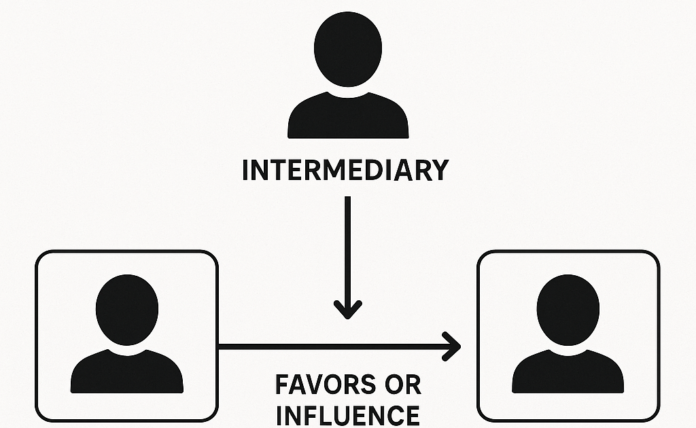[ad_1]
Influence peddling—also known as trafficking or trading in influence—is the practice where an individual uses their access to government officials or authority figures to secure favors, benefits, or preferential treatment for another party, usually in exchange for payment or other forms of compensation. While this conduct might sometimes fall within legal grey areas, the underlying ethical concern is that it undermines public trust and the integrity of democratic institutions.
The Organisation for Economic Co-operation and Development (OECD) distinguishes between “influence peddling” and “undue influence peddling”, with the latter specifically referring to illegal lobbying activities. Influence peddling can range from informal lobbying to outright corruption, depending on the circumstances and local laws.
Influence Peddling under the Indian Prevention of Corruption Act (PCA)
In India, the legal boundaries governing such conduct are laid out in the Prevention of Corruption Act, 1988 (amended in 2018). The PCA specifically aims to combat corruption among public servants and prevents the abuse of official position for personal gain.
Relevant provisions under the PCA relating to influence peddling:
1. Bribery & the Abuse of Influence
The PCA criminalizes the act of:
-
Offering or accepting any “undue advantage” (money, gift, or favor) with the intention to, or as a reward for, influencing a public servant’s official acts, or to make them forbear from acting in the exercise of their official functions.
Section 7 and Section 8 of the Act strictly prohibit public servants and third parties from:
-
Requesting, receiving, or accepting undue advantage to influence, or attempt to influence, the conduct of a public servant.
2. Third-Party (Intermediary) Bribery
Section 8 specifically deals with bribery by commercial organizations or individuals on behalf of others—this covers the typical cases of influence peddling, where a person or agent solicits or receives undue advantage from someone in exchange for using their influence over a public servant.
3. Broad Scope—Direct and Indirect Influence
The law is intentionally broad: it covers not just straightforward instances of bribery, but also situations where an individual claims to have influence (even if they have none) and takes or seeks payment for providing such influence.
Legal Status: Influence Peddling Per Se
-
Influence peddling as a commercial or political practice is not automatically illegal in India.
-
It becomes an offense when it involves the exchange of an “undue advantage” for using actual or purported influence over government decisions, especially where it subverts merit or public interest.
Consequences
Conviction under the PCA for such acts can lead to imprisonment, fines, and the confiscation of property acquired through corrupt practices. The Act aims to ensure that no individual or company can lawfully benefit from leveraging connections for illegal gain, maintaining the integrity of government decision-making.
Conclusion
While certain forms of lobbying or advocacy may be legitimate, influence peddling that involves bribery or the abuse of public office is a clear offense under the Indian Prevention of Corruption Act. This robust legal framework is essential for upholding transparency and curbing corruption in public administration, thereby reinforcing faith in democratic governance.
[ad_2]
Source link

